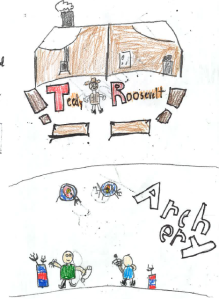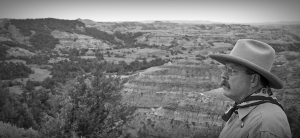
The economic downturn in 2008 hit my home like it did for many of my executive friends who experienced “opportunity” to find new places to work. For me personally, it was a devastating experience. There was very little work for a Marketing executive when few were buying anything. My network was good, but not that good.
My opportunity came from an unlikely source – Theodore Roosevelt.
“Do what you can, with what you have, where you are”. (TR)
If I had been given the choice, I would have picked George Clooney as my doppelganger, but mine is Theodore Roosevelt. As an occasional actor, I hoped there might be some part-time work I could pick up looking like him.
My contact to agents who specialize in look-alikes was not promising. If I looked like Elvis or Marilyn Monroe, I might keep busy, but all recommended “Don’t quit your day job”.
Research into a job as a Presidential Impersonator was even more defeating. It’s great work if you resemble the current President. Potentially six figures, travel, fake secret service – in a word – “awesome” – for up to 8 years. Once that President is out the door, you will be too. My research wasn’t going the way I had hoped.
I decided to explore the motivational speaking circuit, as I figured there must be some call for motivating talks from famous leaders! There is for living ones, but there was not much demand for dead ones. Three strikes and I should have been out.
“Believe you can, and you are half-way there”. (TR)
A smart man stops after all the market research tells you to quit. I was not about to let common sense get in my way.
I watched the Edison movies of Roosevelt, listened to recordings and memorized quotes. Accomplishing those quickly, I found a place to do my first talk. My nerves were so frazzled that I was able to crack my voice as Roosevelt did in real life without effort. Anxiety flowed out of my pores and dripped off the end of my nose. People were cordial as I wiped my brow repeatedly. Once I finished my talk, they applauded! They thanked me and a few wanted my business card.
Each time I presented I got a little better. My many hours of research on Roosevelt was paying off as I became better versed in his policies, his family and accomplishments. As my confidence grew, so too did the requests. I went from presenting just facts to presenting the concepts around the facts.
Then one day everything changed. What made the difference was the day I truly internalized what I had been saying as the great man. The words were no longer just “sound bites”. They had become real for me – thus becoming real from me.
“With self-discipline, most anything is possible”. (TR)
My personal goal from that point forward was to make people feel as if they had actually met Theodore Roosevelt. I decided if I could do that, anything I wanted to achieve with my being “Teddy”, was possible.
The first time it happened was at a large history education event where they bused in school children during the week. The event was open to the public for the weekend which allowed a very angry mother to place her daughter in front of me with firm orders I was to tell her that I was NOT Roosevelt. I refused. Mom learned from President Roosevelt that day that belief was an essential driver to success. I had perfected convincing a child. But I needed to convince an adult – a living, breathing intellectual adult.
It occurred one Sunday a few weeks later when a couple sheepishly came up to me at a similar multiple day event. “Remember us?” they asked as they looked me up and down. “Indeed I do! How are you?” I responded.
They went on to inform me that they had become so engrossed in our conversation the previous day that after they left and went home, they each started to question what they had experienced. I had tested their reality just enough that they decided they needed to come back to make sure I was actually at the event and that I was just a guy who looked and acted like Roosevelt. Today, most people ask me questions by starting with “Mr. Roosevelt?” and often comment later in the hallway about how real it felt to them.
“No one cares how much you know, until they know how much you care” (TR)
Since my revelation of the goal of making it “real”, I have been blessed with ongoing referrals that keep me busy across the country. My talks are no longer just sound bites and quotes, but impactful discussions about the application of Roosevelt’s ideas, delivered by him, that we can apply each day to improve our own lives and those around us. My appearances have expanded far beyond history events to include convention keynotes and government functions. I have raised millions for wildlife conservation and helped to create a National Monument, all as T.R.
Wherever I am, I encourage people to embrace Roosevelt’s idea of “Do what you can, with what you have, where you are” and apply his principal of “Believe you can, and you are half-way there!”
For myself, I have learned that I believe we all have the capacity to reinvent ourselves just as Roosevelt did many times over. Doing so takes incredibly hard work, courage to face your critics and determination to push far beyond your own comfort level. It also requires the support from others who cheer on your efforts and help you brush yourself off when you fail.
But in the end, “Far and away the best prize that life has to offer, is the chance to work hard at work worth doing”.
Adam Lindquist is the Director of Membership for the Professional Risk Managers International Association who support his passion with job flexibility to work as an award-winning Theodore Roosevelt look-alike, educator and speaker.
 ave been blessed with many wonderful testimonials of support for what I do from many adults, but it is by far the most gratifying when I hear from children who have met me, who write and thank me for teaching them about someone I feel they need to know about. Most children are gloriously “filter free” and will tell you what they think. “You are not him, you are dead” is one I hear once in a while that still makes me laugh. I simply smile and reply “I am standing right in front of you as fit as a Bull Moose!”
ave been blessed with many wonderful testimonials of support for what I do from many adults, but it is by far the most gratifying when I hear from children who have met me, who write and thank me for teaching them about someone I feel they need to know about. Most children are gloriously “filter free” and will tell you what they think. “You are not him, you are dead” is one I hear once in a while that still makes me laugh. I simply smile and reply “I am standing right in front of you as fit as a Bull Moose!”






